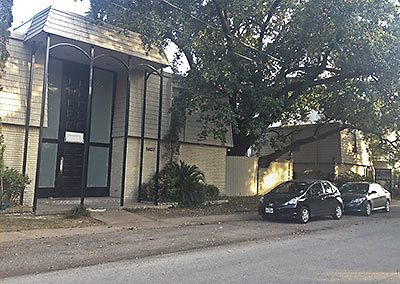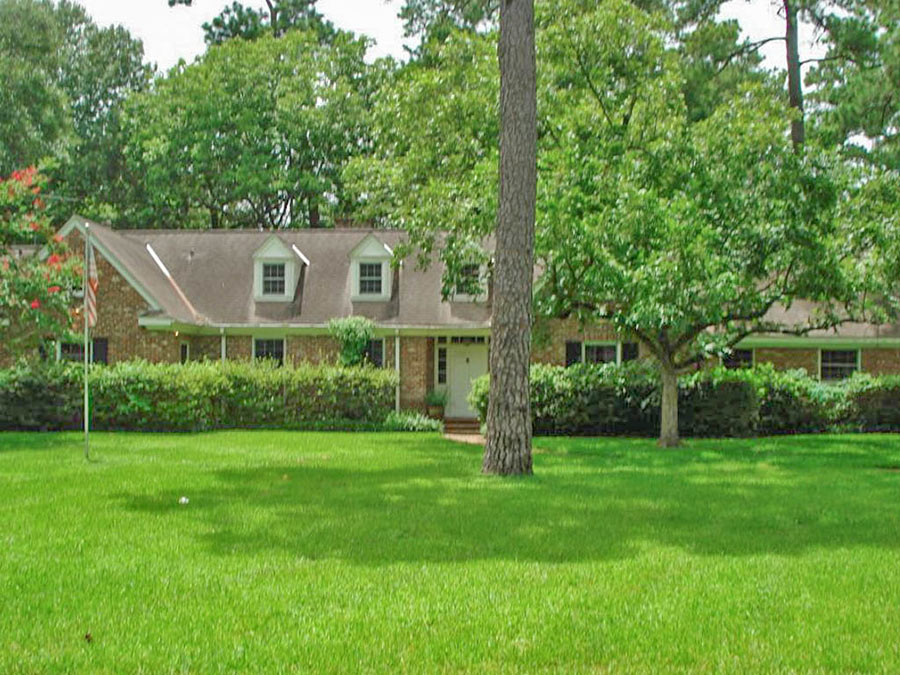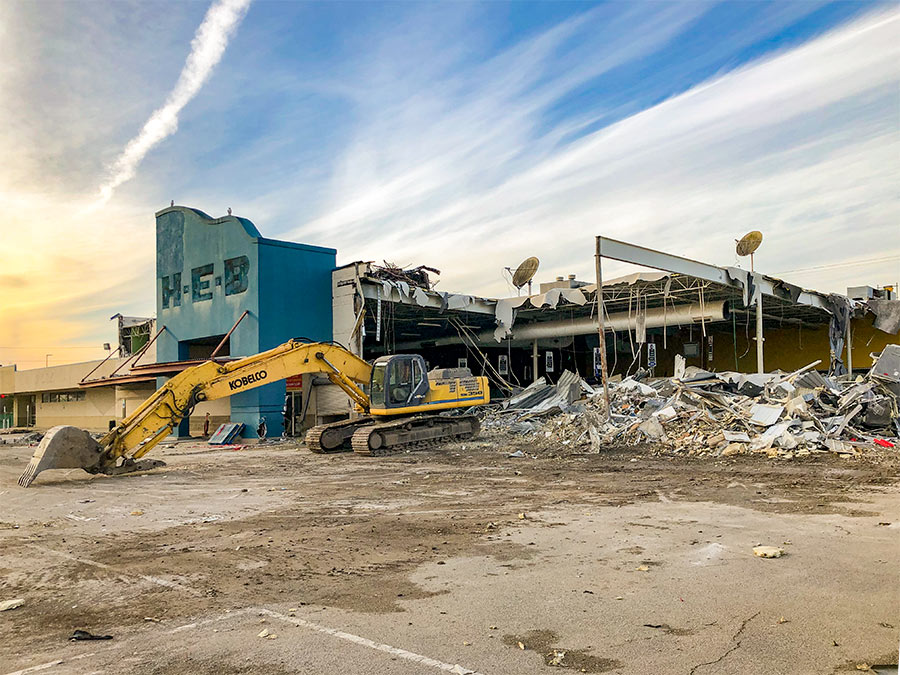
A resident at this 1970s apartment complex tells Swamplot that it has been sold and that notices to vacate by the end of September have been sent around: Demolition, the resident suspects, is nigh. The 21-unit, 13,750-sq.-ft. complex sits at 1407 Missouri, between Commonwealth and Waugh in Hyde Park just 2 blocks north of foodie row — Hay Merchant, Underbelly, Blacksmith, etc. — along Westheimer. County records show that the 18,625-sq.-ft. property was sold as recently as March to Legacy Community Health Endowment.
Photo: Swamplot inbox





Notice:
Anyone living in a pre 1990 apartment in the Westside inner loop that’s paying less than 900 a month for a one bedroom should start boxing their stuff now-
City of Houston
(we don’t give a shit if you’re hard working and can’t afford any other place, progress is progress, move to San Antonio)
All those cool garden apartments built around River Oaks and Southhampton are toast–all the lush courtyards and old trees plowed under–
well thats my vote for comment of the day
@Shannon, nobody owes anyone affordable housing or an opportunity to live in a location they can’t afford. Best Use of Land doctrine is the fairest system to everyone involved.
@commonsense—read Machiavelli much?
why don’t developers or apartment owners want to build small (less than 25 units) apartment complexes around montrose or rice? how come we only see the old units torn down and redeveloped? do the economics of the small rental not work anymore? it seems like there is a lot of demand for nice 1 bedrooms and i think a renter will pay up to $1500 for a nice 1br. i’d be interested in investing or building something like this in the future? thoughts?
dream
I’d love to live in Piney Point but why I can’t find an owner that will see me something in my budget? Because there’s a little something called “market value”.
@dream – I understand your point but my uncle (who was a developer) explained it to me this way – a little project means little profit and a big project means big profit.
@ Shannon – read anything much?
@dream, the economics don’t work on many levels… the land is too expensive, the gross rent is not high enough, no space to place amenities like a pool, gym, etc. that all $1,500 a month require. Can’t get financing for something like that…. and most importantly a waste of time, why not spend your efforts on a much bigger complex with a much higher ROI?
@ dream: There exist economies of scale such that the operating costs for a small complex with a competitive set of amenities and marketing activities are much higher per unit; such things can be reduced, but doing so impacts revenue potential.
As a consequence of this, you won’t typically see new apartment projects proposed that have fewer than 150 units, and in the rare instance that you do, it’s only on a very-well-located site that has shape/size issues that every bidder understands and adjusts their bid downward to compensate for.
Regarding small rentals, you are correct that the market for one-bedroom units commands a premium in terms of dollars per square foot. The market for them is strong. This is why developers in the inner city have shifted toward a unit mix with a strong majority of one-bedroom units and largely abandoned three-bedroom floor plans altogether.
I like the older housing stock, too, but they tend to be physically and functionally obsolete. When I lived in one such complex I had to go to Home Depot, buy a section of copper wire and a new receptacle, then heat up one end and hammer it flat so that I could stick it into the grounded hole in the 20 amp receptacle for the window A/C unit so that I could run it to the new 15 amp receptacle in order to ground my home theater system. Okay, so that’s problem #2. What do you suppose problems number three through six were? And what was problem #1? Bear in mind, I’m not new money or a trust fund baby or anything like that. Neither were the neighbors of mine that were likewise putting up with these sorts of things. So there’s an issue with the quality of the tenant base, too.
Given that the new owner is Legacy and that this property backs up to the Legacy parking lot that is ALWAYS full, it’s possible that this property is destined to provide additional parking, not new townhome or mcmansion development.
@niche lets say your own a 20k sf lot in the montrose and you wanted to build an income property. what would you build? small office, multi story apartments, or something else? how much would it cost to build something like this psf?
you just never see any 10 unit complexes anymore being put on corner double lots, they all get demolished for a larger complex or for 3 to 4 story attached residential. do you think it makes more sense to buy older small rentals, 4 to 8 plexes etc and just remodel or upgrade the existing?
dream
It’s not really about what the buyer/developer wants to do with the property. It’s about whether the current property owner wants to sell…and for how much. I’m sure many owners of these small complexes have been waiting years to cash out, and given the escalating prices of land, who can blame them for selling, especially if they’re nearing retirement?
Still, it’s sad to see some of the well-maintained smaller complexes go. I lived in an 8-plex in Montrose for 10 wonderful years. There’s nothing like living in a small complex. It was later sold and converted into a single-family home, of all things, but at least they didn’t knock it down.
@Bitch–yes, I read, I’ve actually read The Prince, @Bitch—have you, @Bitch
Rock on Shannon!
When asked directly about the property Legacy has stated that they will be turning it into additional parking.
@ dream: If its only a 20,000-square-foot lot, then that’s probably townhome land. If it has good commercial frontage or some kind of awesome amenity right next to it then there might be other possibilities.
I can tell you from professional experience that apartment developers will pass on such a site. They know beyond a shadow of a doubt that a townhome developer can afford to pay more for the land than they can, so there is no point in wasting their time.
Yes, it can make sense to buy small apartment projects and maintain or update them. You might do so in order to engage in land speculation with cash flow. (It may not be positive cash flow, but it would be something.) You might also take on that strategy in order to build up a portfolio of assets that can eventually be refinanced and cross-collateralized in order to obtain higher leverage or to finance the project that gets you into the big leagues. That being said, there are numerous pitfalls in doing so. Every small-time apartment investor that I’ve ever done business with has got horror stories. You’ll almost certainly have issues with the city; you’ll probably have issues with the tenants; you may have issues with the neighbors. And if you’re super unlucky then you have something like a meth lab explosion where an injured third-party tries to go after you for negligence. (If it were a big complex or at least a decent portfolio of small complexes, then its actually a whole lot easier and less expensive per unit to put protocol in place to mitigate liability.)
There is one really positive exception to my cautionary tales that I should point out. An individual can obtain residential financing and the possibility of individual bankruptcy protection for up to a four-plex if they live in one of the units. It doesn’t matter which unit they live in, so it could be the garage apartment behind a three-plex and you could collect enough rent to pay all the debt and expenses and be golden. And if there’s a financial catastrophe then nobody can kick you out on the street.
@Niche great insight. Thanks for the info.
Dream
I actually have a 20k SF lot in Houston (or rather 4x 5k lots side by side, corner to corner. Right now they have some old fourplexes on them but they’ll be going away soon.
.
I’d love to keep them but they are red tag magnets for the city. It’s just not worth it. We’re constantly upgrading them but the stuff the city makes us do is just too costly for the rent they bring in.
.
No need to type this out again on a page 5 story but the city is a HUGE reason some of these older places are going away. That “our montrose” group (www.ourmontrose.org) talks about it in more detail.
Cody is correct: the CITY does not want old housing stock. Of course, that policy has it’s exceptions-for instance in the Mayor’s tightly enforced / deed restricted neighborhood of Westmoreland! Double standards imposed,without a VOTE, by our Mayor!! One solution to the parking issue in the Montrose /the Heights /Midtown/etc. Buy a whole block and build a very nice 5-10 story parking garage: disguise the sides with concrete trellis design /and-or a wire screen with vines growing on it. Landscape the ground level to the nines and plant a bunch of fast growing trees in the right of way.That way less concrete ugliness.Charge competitive parking rates. And viola: fewer cars clogging up the streets. More parking and lest anyone bitch about a towering structure: get over it. This IS Houston: land of NO zoning and neighborhoods with NO or somewhat or not at all enforced deed restrictions. And FYI all of NIMBYer’s: see the Ashby high rise, Legacy Clinic, the FOUR story townhouses going up in the 1700 block of Welch and the FIVE story townhouse going up behind the grand old story home @ 903 Welch( the new structure faces Converse ). If the neighbors don’t protest/try to stop towering residences like these,why be all uptight & pissy about a possible parking or whatever structure? Said parking garage is just as ugly as a LOT of the newer/new construction. Deal with it.